Examining the Book of Isaiah 3
Mike Ervin
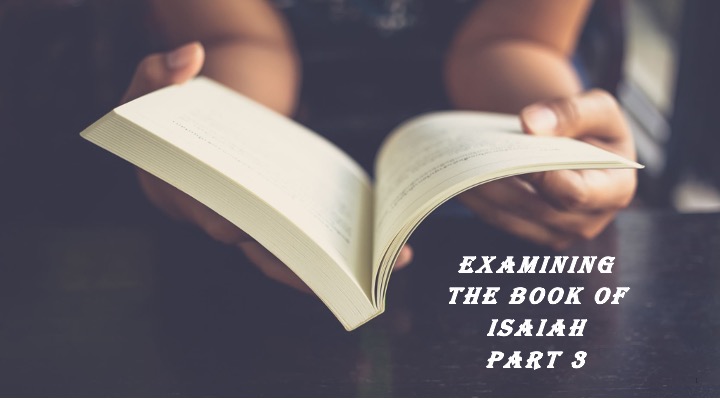
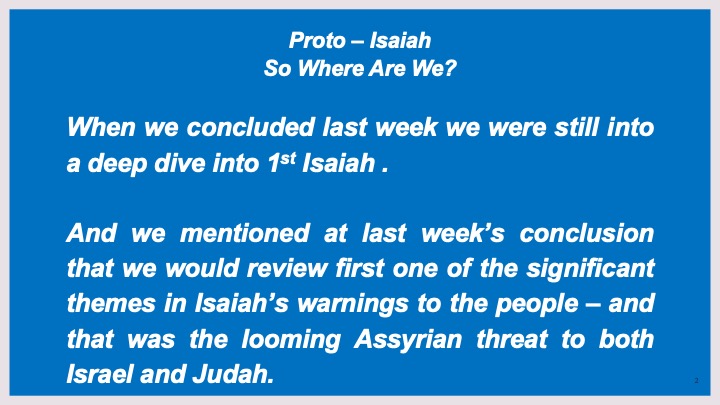
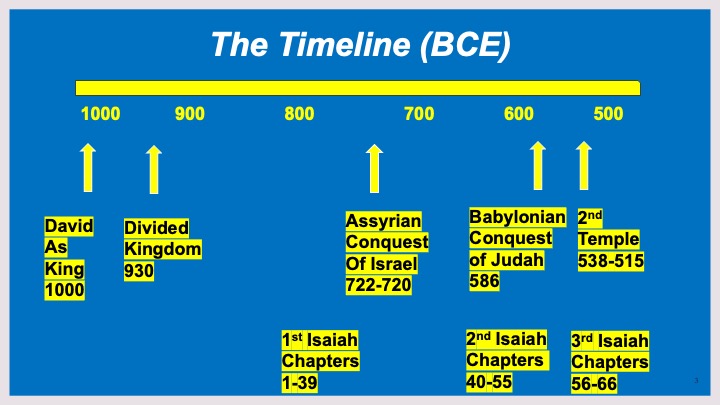
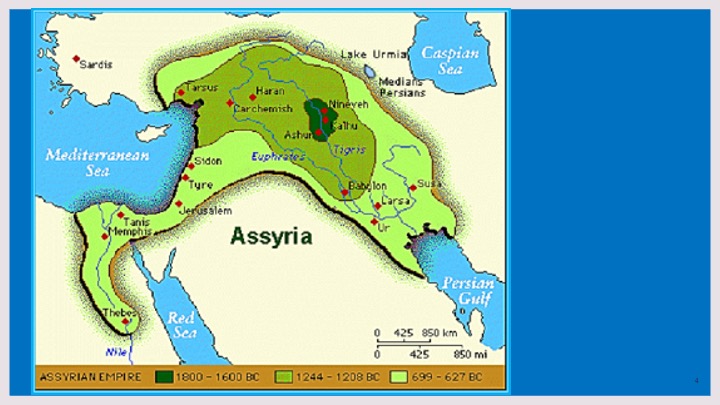
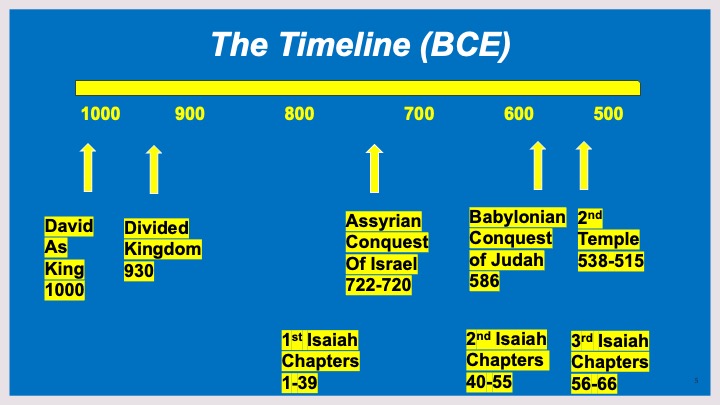
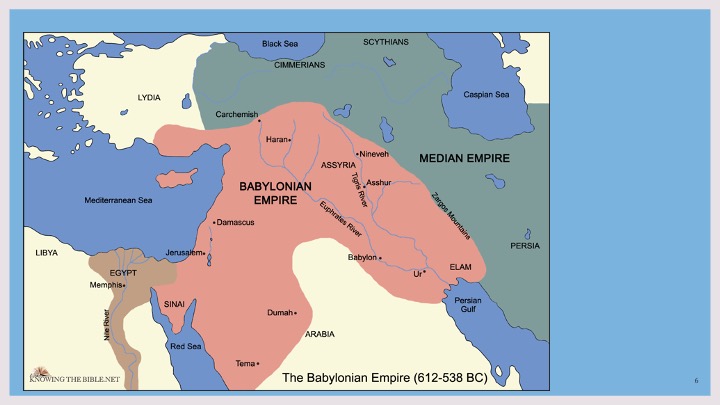
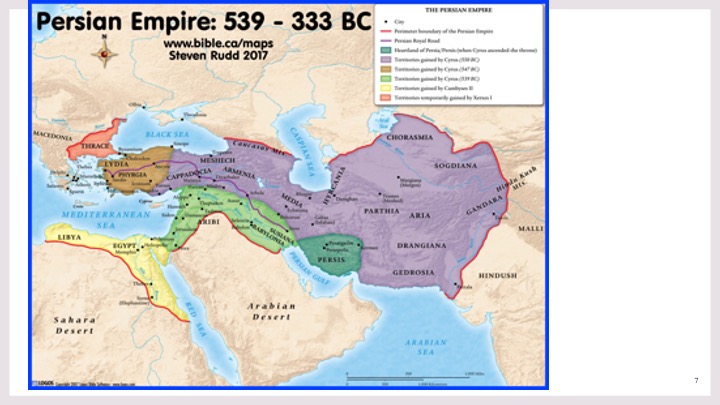
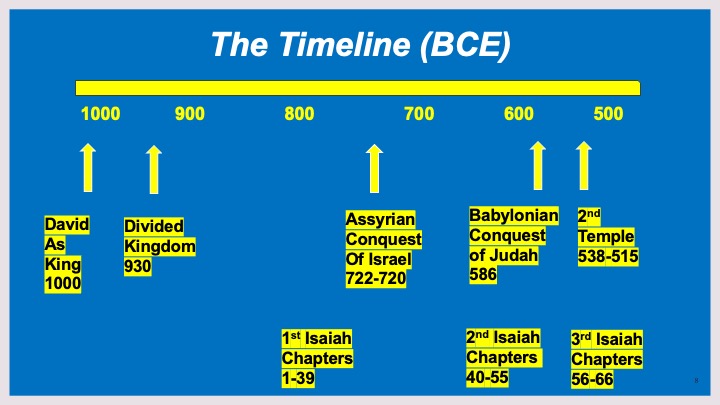
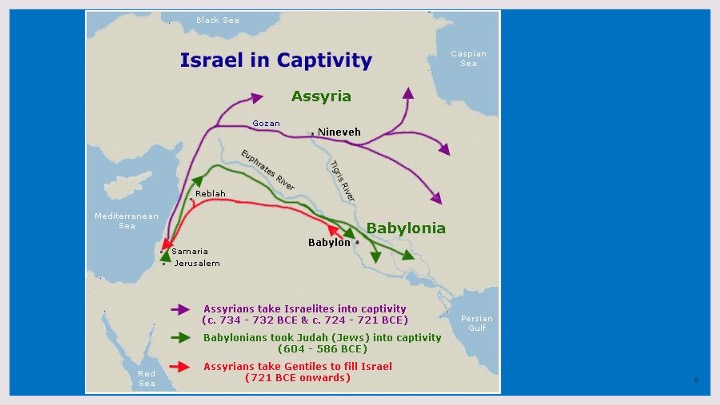
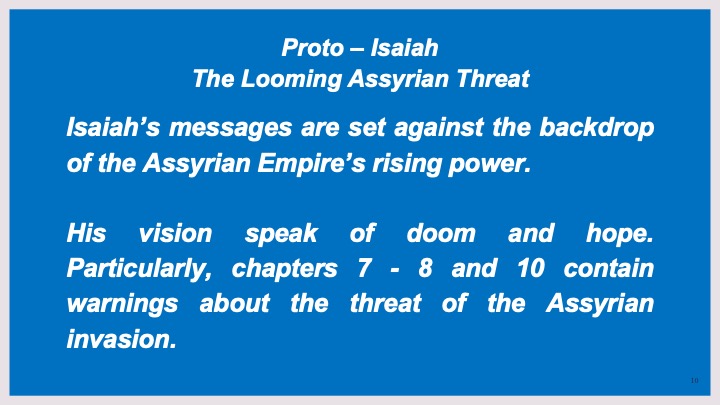
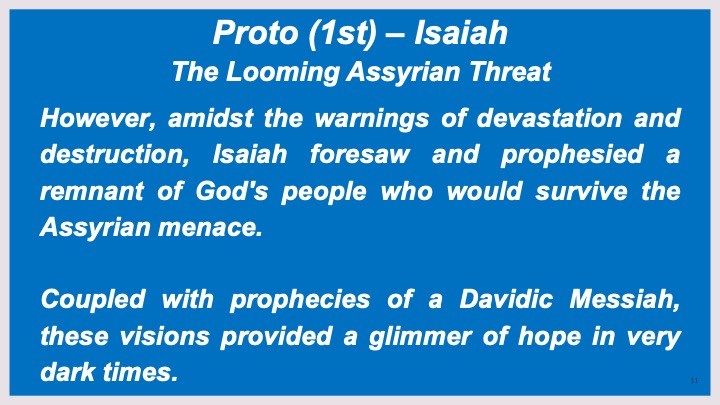
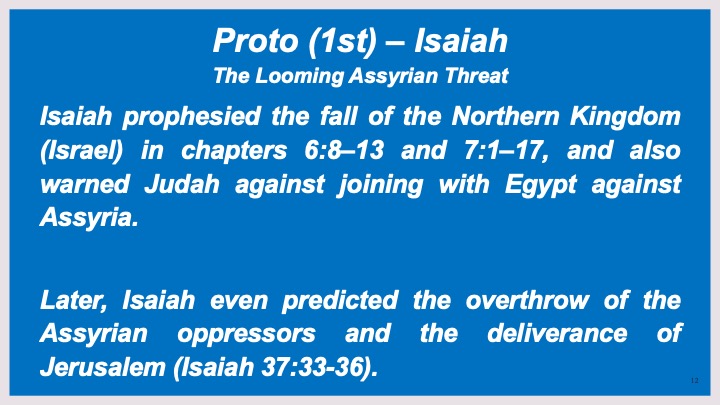
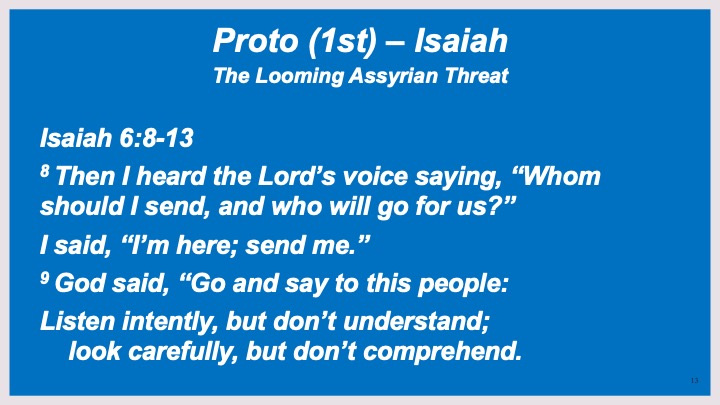
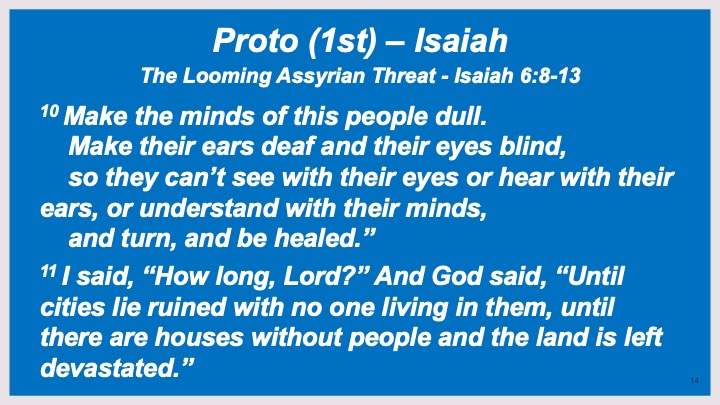
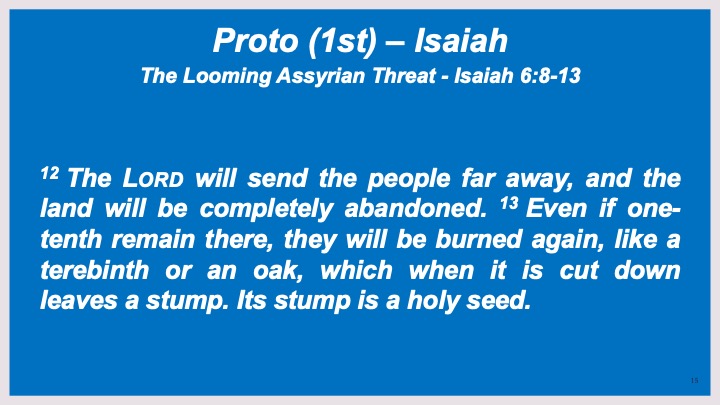
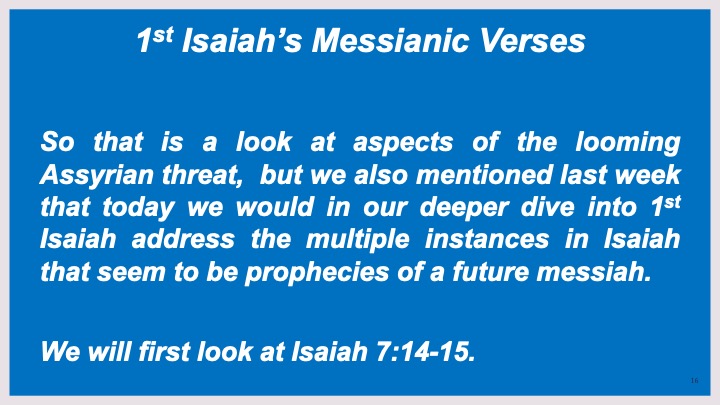
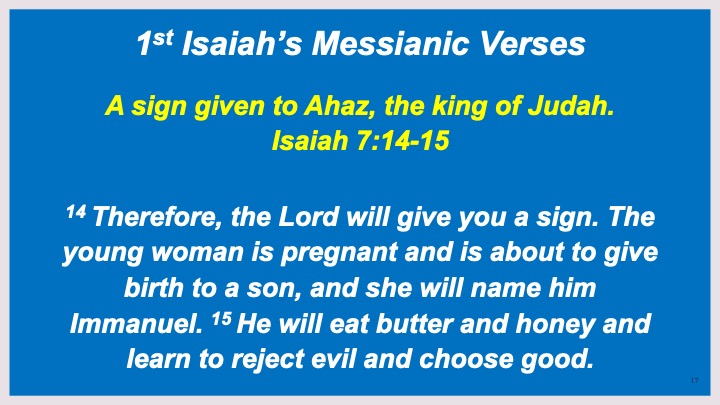
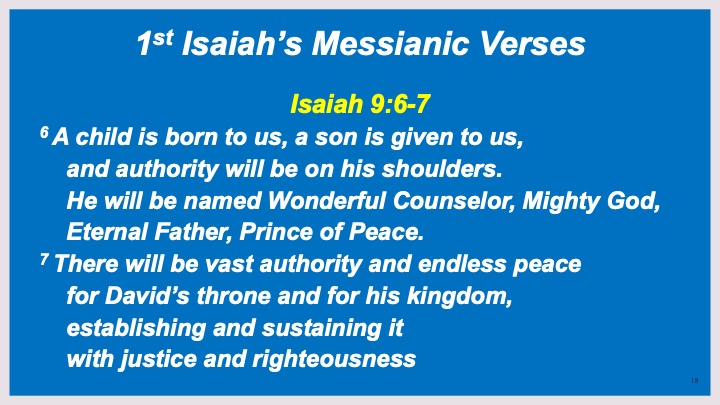
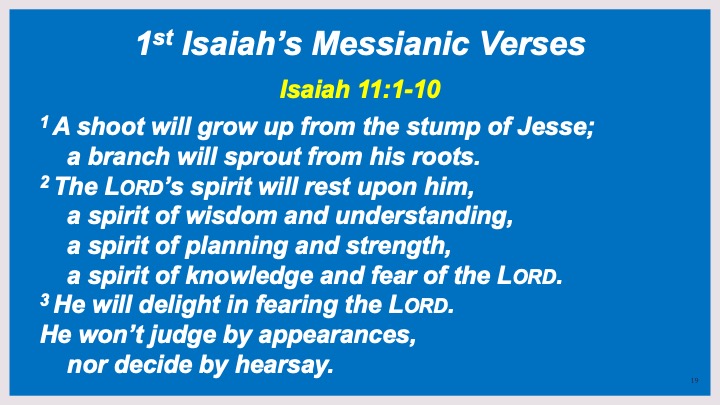

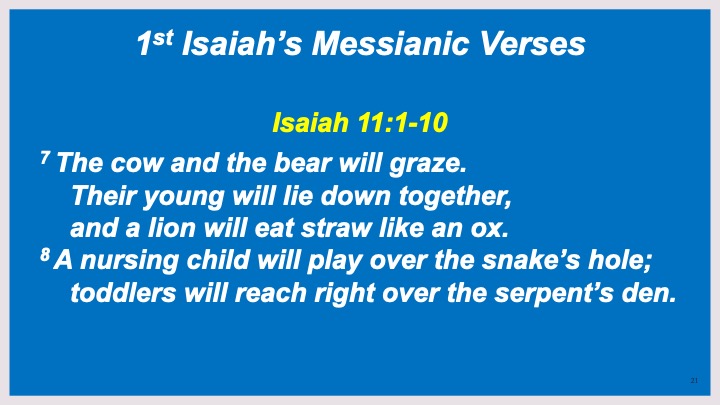
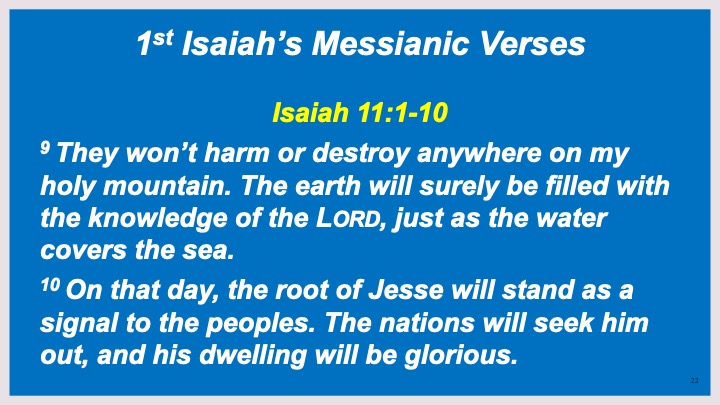
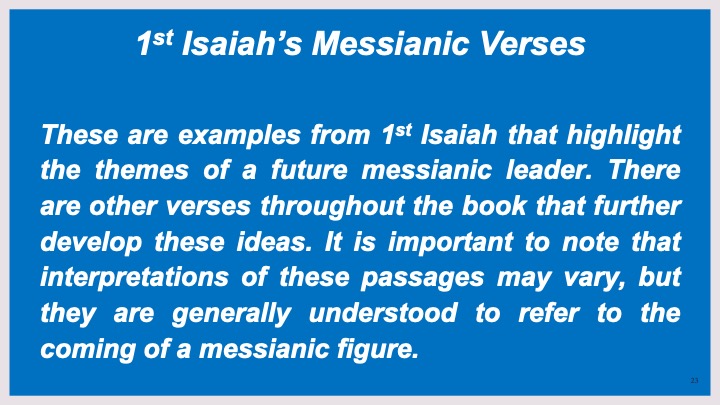
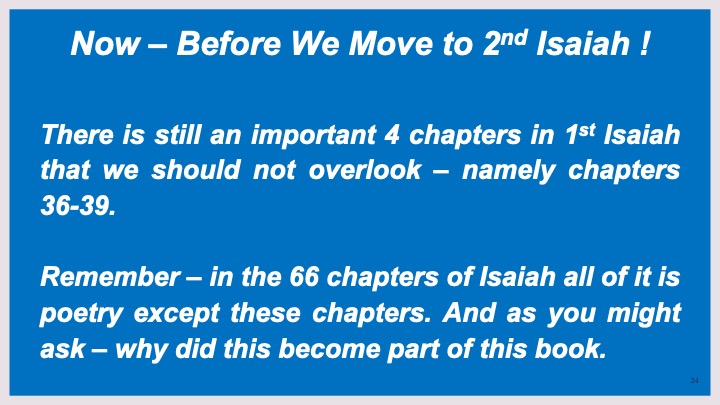
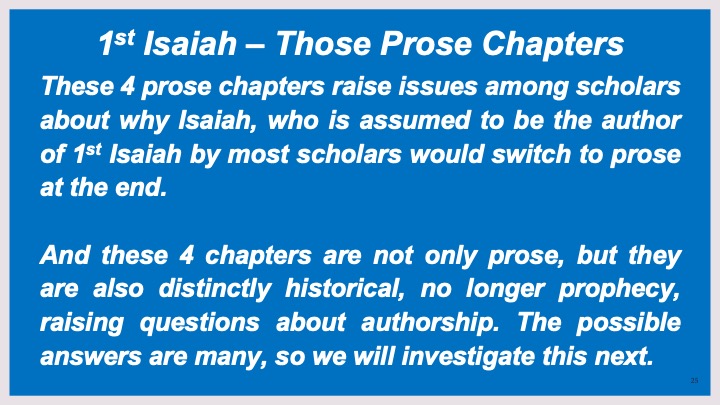
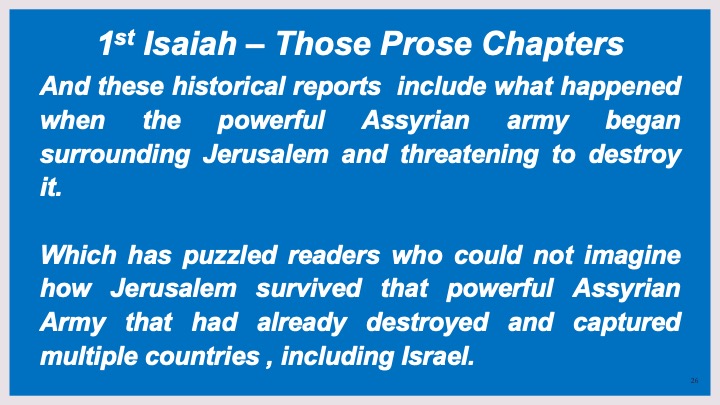
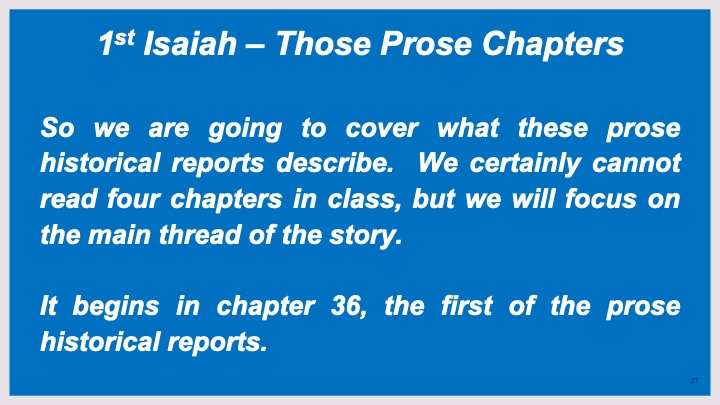
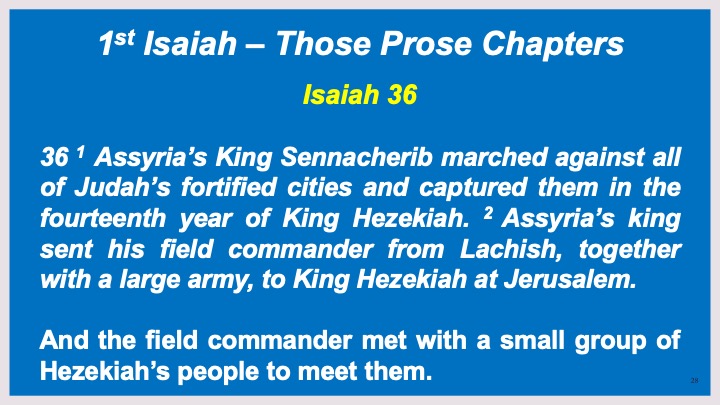
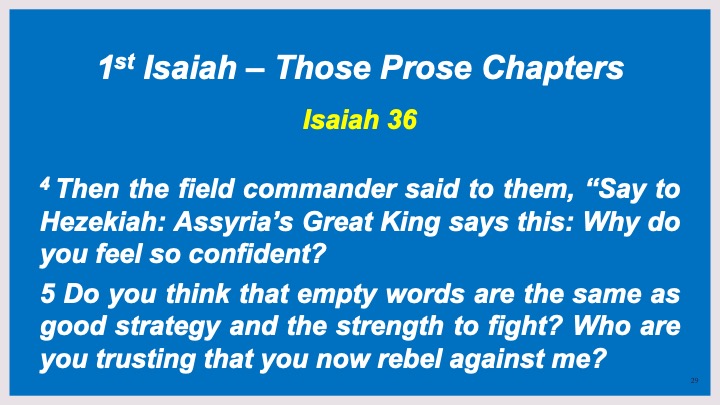
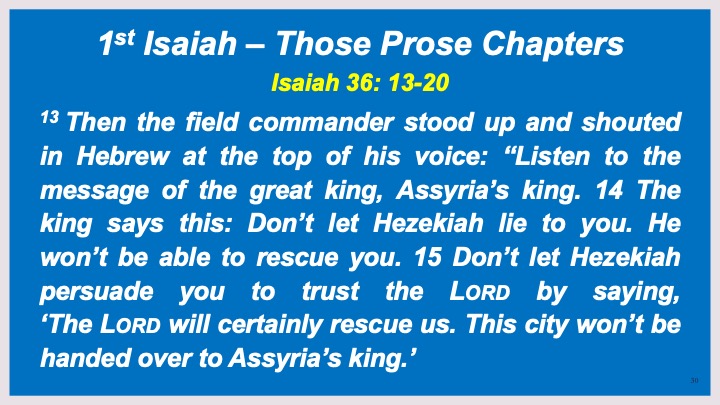
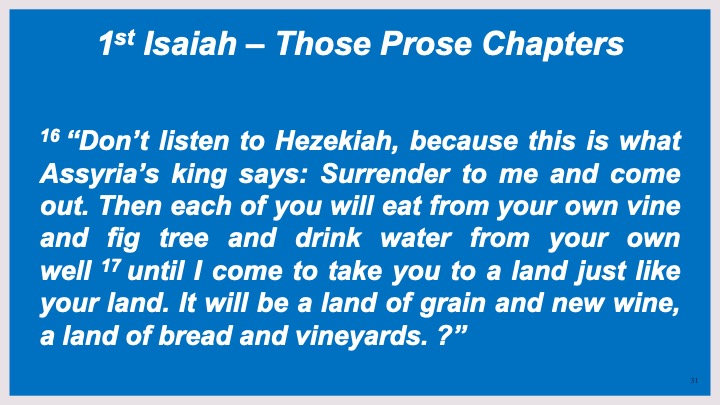
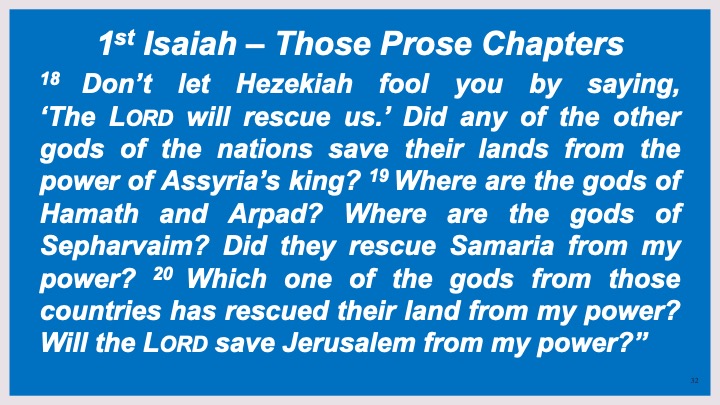
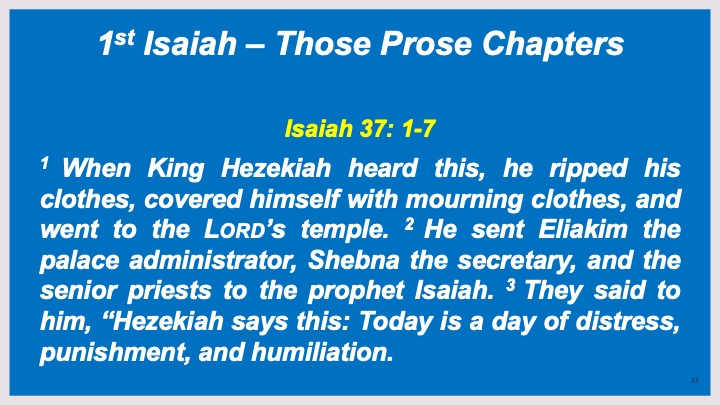
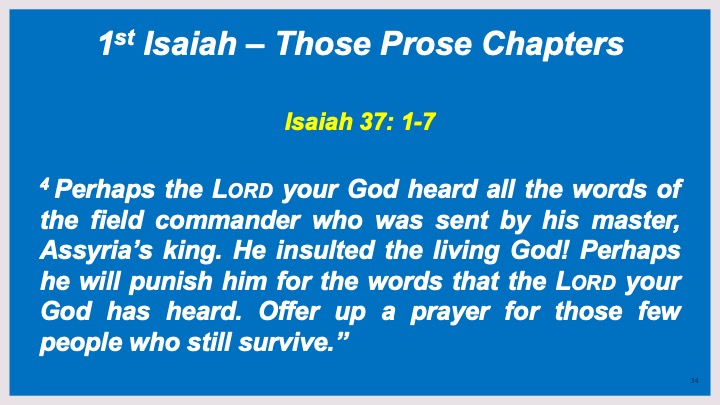
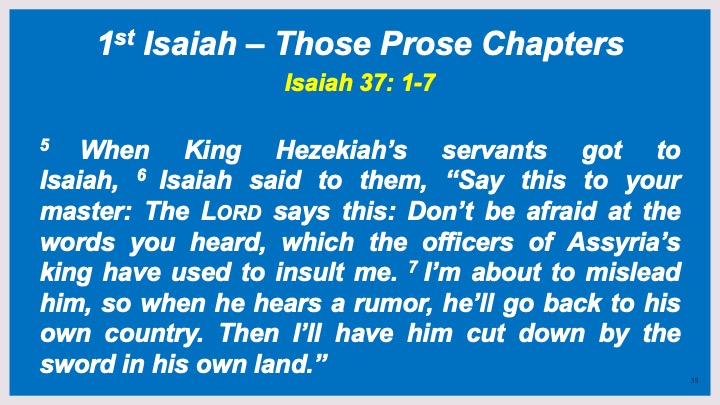
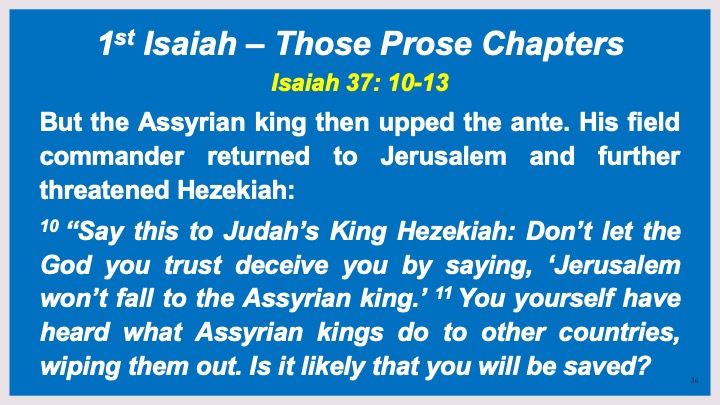
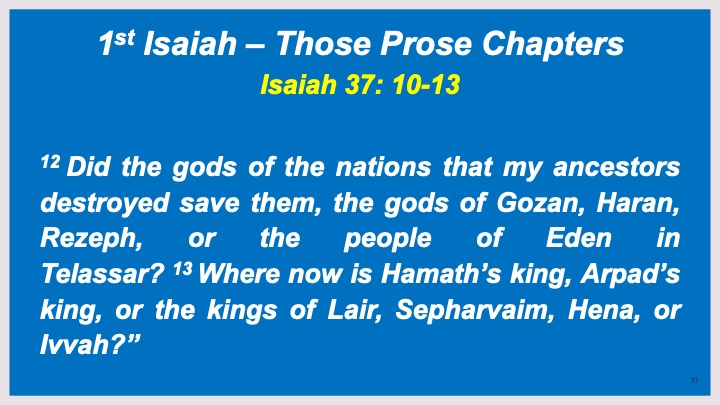
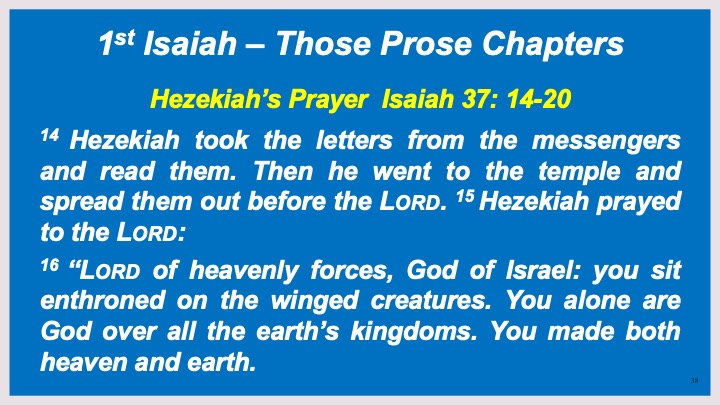
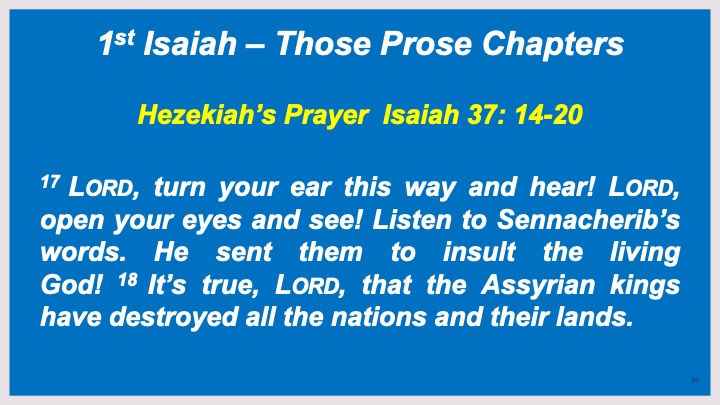
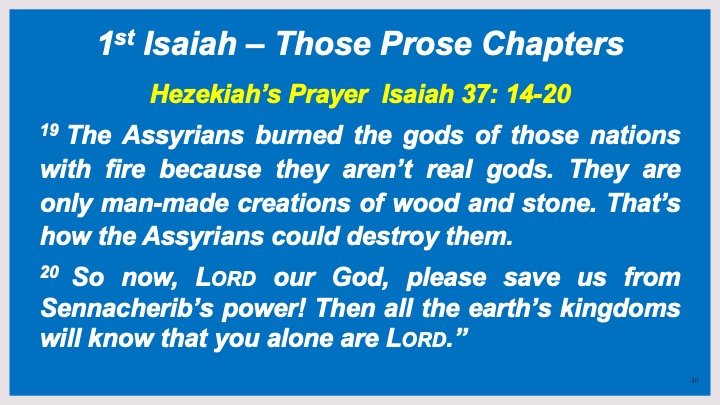
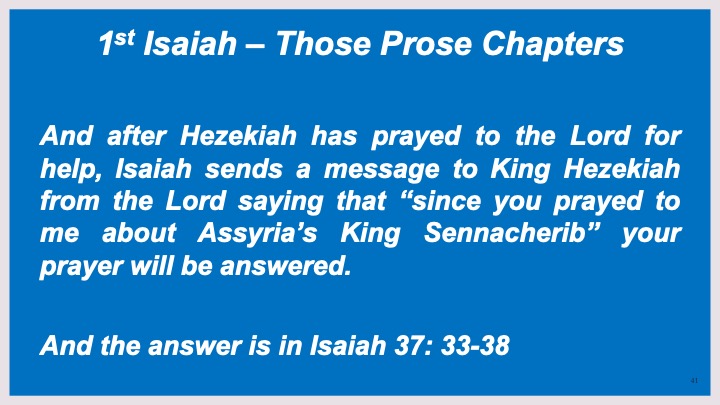
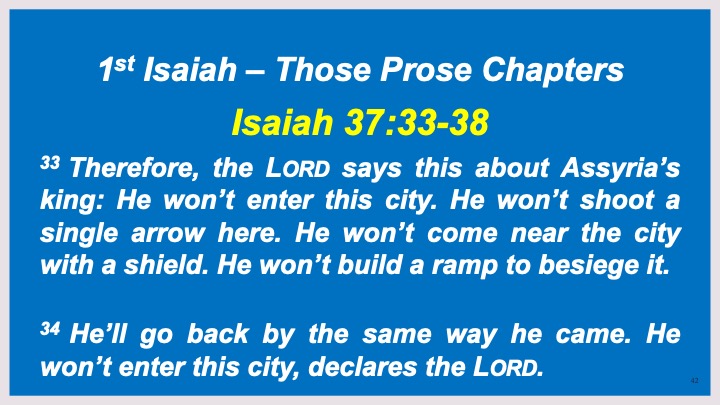
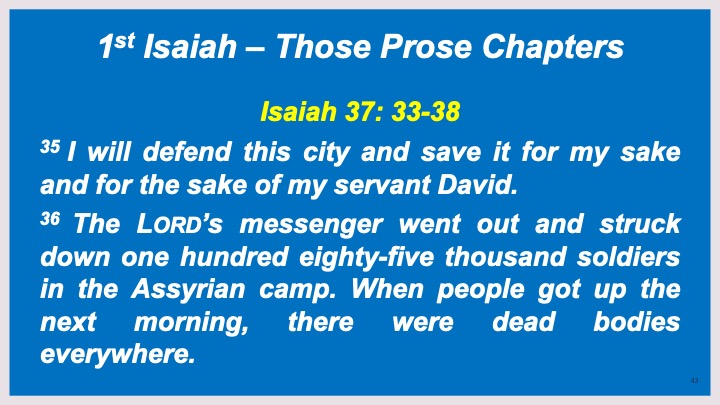
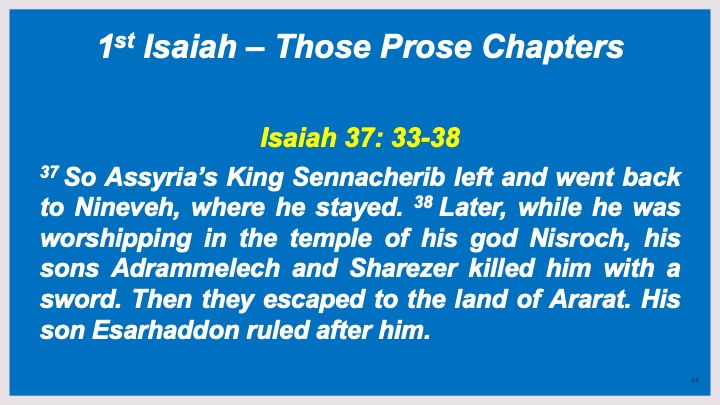
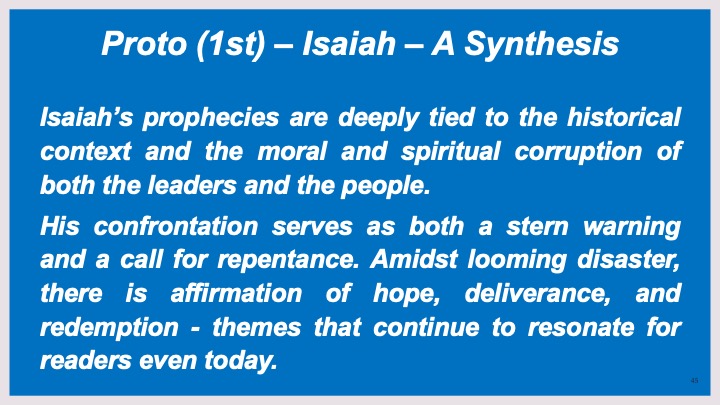
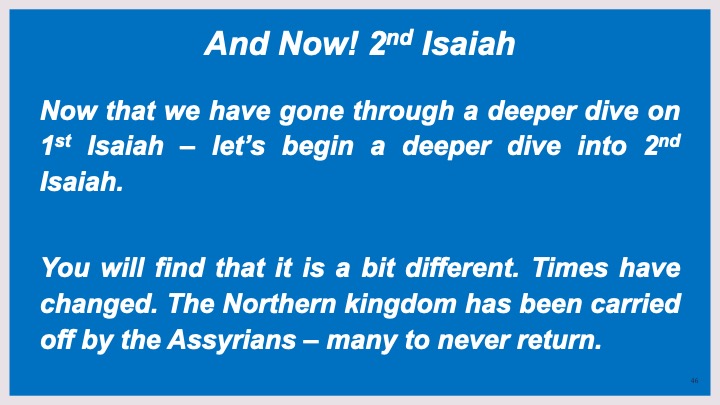
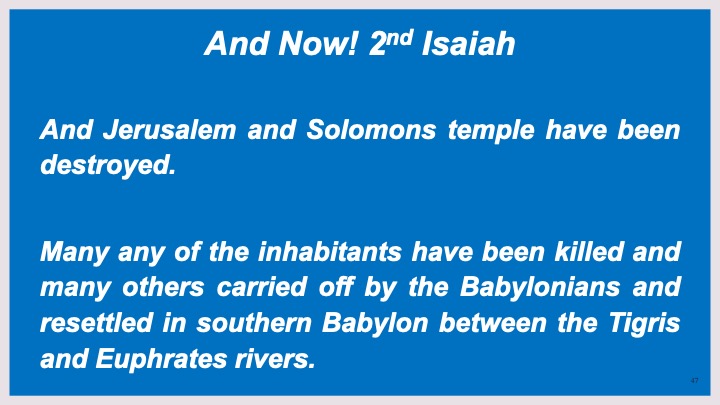
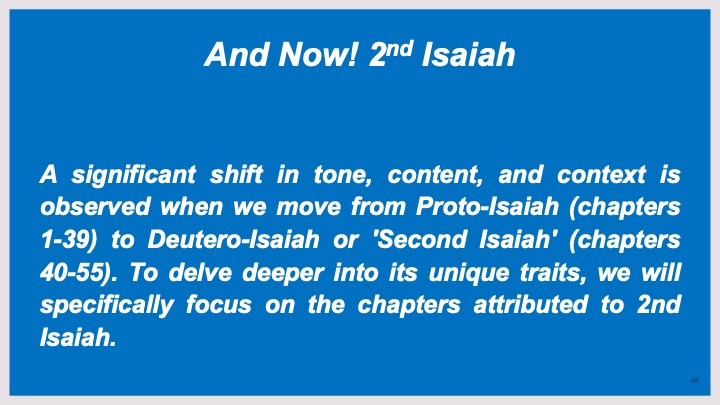


Isaiah Part 3 Text
When we concluded last week we were still into a deep
dive into 1st Isaiah .
And we mentioned at last week’s conclusion that we would review first one of the significant themes in Isaiah’s warnings to the people – and that was the looming Assyrian threat to both Israel and Judah.
Proto – Isaiah
The Looming Assyrian Threat
Isaiah’s messages are set against the backdrop of the Assyrian Empire’s rising power.
His vision speak of doom and hope. Particularly, chapters 7 - 8 and 10 contain warnings about the threat of the Assyrian invasion.
However, amidst the warnings of devastation and destruction, Isaiah foresaw and prophesied a remnant of God's people who would survive the Assyrian menace.
Coupled with prophecies of a Davidic Messiah, these visions provided a glimmer of hope in very dark times.
Isaiah prophesied the fall of the Northern Kingdom (Israel) in chapters 6:8–13 and 7:1–17, and also warned Judah against joining with Egypt against Assyria.
Later, Isaiah even predicted the overthrow of the Assyrian oppressors and the deliverance of Jerusalem (Isaiah 37:33-36).
Isaiah 6:8-13
8 Then I heard the Lord’s voice saying, “Whom should I send, and who will go for us?”
I said, “I’m here; send me.”
9 God said, “Go and say to this people:
Listen intently, but don’t understand;
look carefully, but don’t comprehend.
10 Make the minds of this people dull.
Make their ears deaf and their eyes blind,
so they can’t see with their eyes or hear with their
ears, or understand with their minds,
and turn, and be healed.”
11 I said, “How long, Lord?” And God said, “Until cities lie ruined with no one living in them, until there are houses without people and the land is left devastated.”
12 The Lord will send the people far away, and the land will be completely abandoned. 13 Even if one-tenth remain there, they will be burned again, like a terebinth or an oak, which when it is cut down leaves a stump. Its stump is a holy seed.
1st Isaiah’s Messianic Verses
So that is a look at aspects of the looming Assyrian threat, but we also mentioned last week that today we would in our deeper dive into 1st Isaiah address the multiple instances in Isaiah that seem to be prophecies of a future messiah.
We will first look at Isaiah 7:14-15.
A sign given to Ahaz, the king of Judah.
Isaiah 7:14-15
14 Therefore, the Lord will give you a sign. The young woman is pregnant and is about to give birth to a son, and she will name him Immanuel. 15 He will eat butter and honey and learn to reject evil and choose good.
Isaiah 9:6-7
6 A child is born to us, a son is given to
us,
and authority will be on his shoulders.
He will be named Wonderful Counselor, Mighty God,
Eternal Father, Prince of Peace.
7 There will be vast authority and endless peace
for David’s throne and for his kingdom,
establishing and sustaining it
with justice and righteousness
Isaiah 11:1-10
1 A shoot will grow up from the stump of
Jesse;
a branch will sprout from his roots.
2 The Lord’s spirit will rest upon him,
a spirit of wisdom and understanding,
a spirit of planning and strength,
a spirit of knowledge and fear of the Lord.
3 He will delight in fearing the Lord.
He won’t judge by appearances,
nor decide by hearsay.
4 He will judge the needy with
righteousness,
and decide with equity for those who suffer in the
land.
5 Righteousness will be the belt around his hips,
and faithfulness the belt around his waist.
6 The wolf will live with the lamb,
and the leopard will lie down with the young goat;
the calf and the young lion will feed together,
and a little child will lead them.
7 The cow and the bear will graze.
Their young will lie down together,
and a lion will eat straw like an ox.
8 A nursing child will play over the snake’s hole;
toddlers will reach right over the serpent’s den
9 They won’t harm or destroy anywhere on my holy mountain. The earth will surely be filled with the knowledge of the Lord, just as the water covers the sea.
10 On that day, the root of Jesse will stand as a signal to the peoples. The nations will seek him out, and his dwelling will be glorious.
These are examples from 1st Isaiah that highlight the themes of a future messianic leader. There are other verses throughout the book that further develop these ideas. It is important to note that interpretations of these passages may vary, but they are generally understood to refer to the coming of a messianic figure.
Now – Before We Move to 2nd Isaiah !
There is still an important 4 chapters in 1st Isaiah that we should not overlook – namely chapters 36-39.
Remember – in the 66 chapters of Isaiah all of it is poetry except these chapters. And as you might ask – why did this become part of this book.
These 4 prose chapters raise issues among scholars about why Isaiah, who is assumed to be the author of 1st Isaiah by most scholars would switch to prose at the end.
And these 4 chapters are not only prose, but they are also distinctly historical, no longer prophecy, raising questions about authorship. The possible answers are many, so we will investigate this next.
And these historical reports include what happened when the powerful Assyrian army began surrounding Jerusalem and threatening to destroy it.
Which has puzzled readers who could not imagine how Jerusalem survived that powerful Assyrian Army that had already destroyed and captured multiple countries , including Israel.
So we are going to cover what these prose historical reports describe. We certainly cannot read four chapters in class, but we will focus on the main thread of the story.
It begins in chapter 36, the first of the prose historical reports.
36 1 Assyria’s King Sennacherib marched against all of Judah’s fortified cities and captured them in the fourteenth year of King Hezekiah. 2 Assyria’s king sent his field commander from Lachish, together with a large army, to King Hezekiah at Jerusalem.
And the field commander met with a small group of Hezekiah’s people to meet them.
4 Then the field commander said to them, “Say to Hezekiah: Assyria’s Great King says this: Why do you feel so confident?
5 Do you think that empty words are the same as good strategy and the strength to fight? Who are you trusting that you now rebel against me?
Isaiah 36: 13-20
13 Then the field commander stood up and shouted in Hebrew at the top of his voice: “Listen to the message of the great king, Assyria’s king. 14 The king says this: Don’t let Hezekiah lie to you. He won’t be able to rescue you. 15 Don’t let Hezekiah persuade you to trust the Lord by saying, ‘The Lord will certainly rescue us. This city won’t be handed over to Assyria’s king.’
16 “Don’t listen to Hezekiah, because this is what Assyria’s king says: Surrender to me and come out. Then each of you will eat from your own vine and fig tree and drink water from your own well 17 until I come to take you to a land just like your land. It will be a land of grain and new wine, a land of bread and vineyards. ?”
18 Don’t let Hezekiah fool you by saying, ‘The Lord will rescue us.’ Did any of the other gods of the nations save their lands from the power of Assyria’s king? 19 Where are the gods of Hamath and Arpad? Where are the gods of Sepharvaim? Did they rescue Samaria from my power? 20 Which one of the gods from those countries has rescued their land from my power? Will the Lord save Jerusalem from my power?”
Isaiah 37: 1-7
1 When King Hezekiah heard this, he ripped his clothes, covered himself with mourning clothes, and went to the Lord’s temple. 2 He sent Eliakim the palace administrator, Shebna the secretary, and the senior priests to the prophet Isaiah. 3 They said to him, “Hezekiah says this: Today is a day of distress, punishment, and humiliation.
Isaiah 37: 1-7
4 Perhaps the Lord your God heard all the words of the field commander who was sent by his master, Assyria’s king. He insulted the living God! Perhaps he will punish him for the words that the Lord your God has heard. Offer up a prayer for those few people who still survive.”
5 When King Hezekiah’s servants got to Isaiah, 6 Isaiah said to them, “Say this to your master: The Lord says this: Don’t be afraid at the words you heard, which the officers of Assyria’s king have used to insult me. 7 I’m about to mislead him, so when he hears a rumor, he’ll go back to his own country. Then I’ll have him cut down by the sword in his own land.”
Isaiah 37: 10-13
But the Assyrian king then upped the ante. His field commander returned to Jerusalem and further threatened Hezekiah:
10 “Say this to Judah’s King Hezekiah: Don’t let the God you trust deceive you by saying, ‘Jerusalem won’t fall to the Assyrian king.’ 11 You yourself have heard what Assyrian kings do to other countries, wiping them out. Is it likely that you will be saved?
12 Did the gods of the nations that my ancestors destroyed save them, the gods of Gozan, Haran, Rezeph, or the people of Eden in Telassar? 13 Where now is Hamath’s king, Arpad’s king, or the kings of Lair, Sepharvaim, Hena, or Ivvah?”
Hezekiah’s Prayer Isaiah 37: 14-20
14 Hezekiah took the letters from the messengers and read them. Then he went to the temple and spread them out before the Lord. 15 Hezekiah prayed to the Lord:
16 “Lord of heavenly forces, God of Israel: you sit enthroned on the winged creatures. You alone are God over all the earth’s kingdoms. You made both heaven and earth.
17 Lord, turn your ear this way and hear! Lord, open your eyes and see! Listen to Sennacherib’s words. He sent them to insult the living God! 18 It’s true, Lord, that the Assyrian kings have destroyed all the nations and their lands.
19 The Assyrians burned the gods of those nations with fire because they aren’t real gods. They are only man-made creations of wood and stone. That’s how the Assyrians could destroy them.
20 So now, Lord our God, please save us from Sennacherib’s power! Then all the earth’s kingdoms will know that you alone are Lord.”
And after Hezekiah has prayed to the Lord for help, Isaiah sends a message to King Hezekiah from the Lord saying that “since you prayed to me about Assyria’s King Sennacherib” your prayer will be answered.
And the answer is in Isaiah 37: 33-38
Isaiah 37:33-38
33 Therefore, the Lord says this about Assyria’s king: He won’t enter this city. He won’t shoot a single arrow here. He won’t come near the city with a shield. He won’t build a ramp to besiege it.
34 He’ll go back by the same way he came. He won’t enter this city, declares the Lord.
35 I will defend this city and save it for my sake and for the sake of my servant David.
36 The Lord’s messenger went out and struck down one hundred eighty-five thousand soldiers in the Assyrian camp. When people got up the next morning, there were dead bodies everywhere.
37 So Assyria’s King Sennacherib left and went back to Nineveh, where he stayed. 38 Later, while he was worshipping in the temple of his god Nisroch, his sons Adrammelech and Sharezer killed him with a sword. Then they escaped to the land of Ararat. His son Esarhaddon ruled after him.
Proto (1st) – Isaiah – A Synthesis
Isaiah’s prophecies are deeply tied to the historical context and the moral and spiritual corruption of both the leaders and the people.
His confrontation serves as both a stern warning and a call for repentance. Amidst looming disaster, there is affirmation of hope, deliverance, and redemption - themes that continue to resonate for readers even today.
And Now! 2nd Isaiah
Now that we have gone through a deeper dive on 1st Isaiah – let’s begin a deeper dive into 2nd Isaiah.
You will find that it is a bit different. Times have changed. The Northern kingdom has been carried off by the Assyrians – many to never return.
And Jerusalem and Solomons temple have been destroyed.
Many any of the inhabitants have been killed and many others carried off by the Babylonians and resettled in southern Babylon between the Tigris and Euphrates rivers.
A significant shift in tone, content, and context is observed when we move from Proto-Isaiah (chapters 1-39) to Deutero-Isaiah or 'Second Isaiah' (chapters 40-55). To delve deeper into its unique traits, we will specifically focus on the chapters attributed to 2nd Isaiah.
So What is Next?
Normally – this slide would be labeled “Next Week.”
But we are near year end and historically the WHPC SS classes only meet during the first two Sundays of December, with a nod to the fact it is Christmas season, and everyone gets heavily involved in Christmas activities.
So Isaiah will proceed on January 7th and 14th, 2024
And next Sunday (December 17th) there will be a church breakfast at 9:45 (egg casseroles) for everyone.